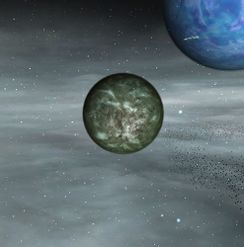Difference between revisions of "Palawan"
From Discovery Wiki
Jump to navigationJump to searchm (infocard link & category added) |
|||
| (3 intermediate revisions by 3 users not shown) | |||
| Line 1: | Line 1: | ||
| − | {{Version|4. | + | {{Version|4.91}} |
{{Planet Infobox | {{Planet Infobox | ||
| name = Palawan | | name = Palawan | ||
| image = Palawan.jpg | | image = Palawan.jpg | ||
| − | | owner = | + | | owner = |
| system = [[Tau-44]] | | system = [[Tau-44]] | ||
| − | | sector = | + | | sector = 3E |
| house = [[Border Worlds]] | | house = [[Border Worlds]] | ||
| − | | population = | + | | population = |
| docking = No | | docking = No | ||
| terrain = Ice | | terrain = Ice | ||
| Line 15: | Line 15: | ||
| escape_velocity = 8.42 km/sec | | escape_velocity = 8.42 km/sec | ||
}} | }} | ||
| − | This stellar body, similarly as its neighbour, [[Planet | + | This stellar body, similarly as its neighbour, [[Planet Malakka]], is a clasification nightmare for scientists. It is too big for a moon, too small for a planet. Palawan has the same geological structure as Malakka's rocky core, as if they were once one. This leads to an assumption that some sort of cataclysm might have broken a bigger Planet into two, of which only the larger Malakka retained its atmosphere. |
| + | |||
| + | |||
| + | [[Category: Border Worlds]] | ||
| + | [[Category: Tau-44]] | ||
Latest revision as of 11:31, 16 February 2019
| Palawan | |
| Location | 3E, Tau-44 Border Worlds |
| Technical information | |
| Docking | No |
| Terrain | Ice |
| Diameter | 9,348 km |
| Mass | 3.83 x 10e24 kg |
| Temperature | -88°C to -60°C |
| Escape velocity | 8.42 km/sec |
This stellar body, similarly as its neighbour, Planet Malakka, is a clasification nightmare for scientists. It is too big for a moon, too small for a planet. Palawan has the same geological structure as Malakka's rocky core, as if they were once one. This leads to an assumption that some sort of cataclysm might have broken a bigger Planet into two, of which only the larger Malakka retained its atmosphere.
